Richard Gere The Dinner
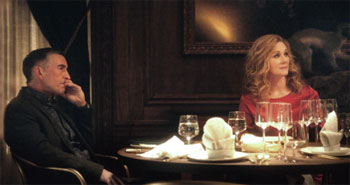
Richard Gere The Dinner
Cast: Richard Gere, Laura Linney, Steve Coogan
Director: Oren Moverman
Genre: Drama
Rated: M
Running Time: 122 minutes
Synopsis: Based on Herman Koch's international bestselling novel, Oren Moverman's The Dinner is a dark, suspenseful drama about the lengths people will go to protect their families and themselves.
Stan Lohman (Richard Gere) invites his younger brother Paul (Steve Coogan) and his wife Claire (Laura Linney) to join him and his wife Katelyn (Rebecca Hall) for dinner at one of the town's most fashionable restaurants. The stage is set for a night of incredible food, awkward conversation and uncomfortable truths.
Paul has seethed with resentment for Stan since childhood, believing that Stan always got more than his fair share of attention from their parents. The fact that Paul is now a history teacher receiving disability benefits after a debilitating nervous breakdown and Stan has become a beloved congressman in the midst of a successful campaign for governor, only deepens his antipathy for his big brother.
While the artfully prepared courses of the meal are brought out by the restaurant's staff, the atmosphere at the table is anything but civilized. Paul seems determined to attack and alienate everyone, and there is palpable tension between Stan and Katelyn. Stan repeatedly refers to some important topic everyone needs to discuss"and everyone else seems set on obstructing that conversation from taking place.
Eventually it becomes clear why Stan has brought everybody together. Both couples have 16- year-old sons who together committed a horrible crime which has shocked the country. The boys gleefully recorded it on video and posted it on the internet. While their sons' identities have not yet been discovered and may never be, their parents must now decide what action to take, if any. As the night proceeds, beliefs about the true natures of the characters are upended, relationships shatter, and each person reveals just how far they are willing to go to protect those they love.
A riveting story filled with many shocking twists and turns, The Dinner is a chilling parable about the savage reality hidden beneath the surface of middle class lives.
The Dinner
Release Date: August 31st, 2017
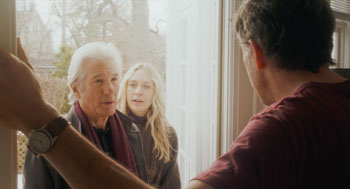 About the Production
About the Production
Since its publication in 2009, Herman Koch's novel The Dinner has become an international bestselling phenomenon, published in over fifty countries. With its masterful story-telling, dark vision and unexpected character revelations, it has been compared to works like Gone Girl and Gods of Carnage, and has precipitated an unusual level of passionate debate. It is a book that compels its readers to look into areas of their lives they might prefer not to. 'It poses an impossible question," says writer/director Oren Moverman. 'What would you do if your children have committed a horrible crime? How far would you go to protect them?"
When he was first approached by producer Cotty Chubb, Oren Moverman was first attracted by the challenge of adapting the book from its native Holland into an American setting. 'It wasn't just a question of adjusting the physical world of the location, but also the emotional world and the metaphors that the book was dealing with, and to try to find analogous things here," he says. 'Also I wanted to take what I thought what was primarily a satirical book and make a tonal shift into more of a drama with a deeper meaning for this country."
As the story of The Dinner begins, two couples, Paul Lohman (Steve Coogan) and his wife Claire (Laura Linney), and Paul's older brother Stan (Richard Gere) and his wife Katelyn (Rebecca Hall), are sitting down for a meal at a fancy restaurant. While the cuisine is grandly presented in courses" Aperitif, Appetizer, Main Course, Cheese Course, Dessert Course, and Digestif"The Dinner is anything but a film about dining and there is actually very little eating in the story. 'The food is ridiculous and that's the point," says Oren Moverman. 'These people's worlds are falling apart but they're being presented Pumpernickel Soil. The courses are actually the narrative courses of the story being told."
The film does not confine itself to the walls of the restaurant or to the evening of the dinner"it is constantly moving in place and shifting in time, gradually introducing Paul's painful memories and physically navigating the emotional history of the four people at the table. Oren Moverman challenges us to see, hear, and feel beyond the obvious. 'The characters all seem to be one thing in the beginning, but throughout the night, you realise they aren't exactly who you thought they were," says the director. 'Thoughout the story, everybody has been hiding something. Eventually you land at a place where there's nothing hidden anymore and everything is exposed."
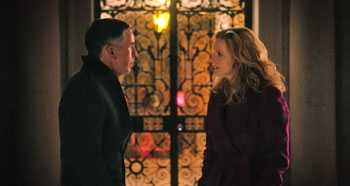 The primary mystery to be unlocked in The Dinner is the true nature of its central character, Paul Lohman, and what he is capable of. 'You start out thinking, -maybe he's a little obnoxious to people, but I like him because he goes out to fancy restaurants and says that he'd rather go out for pizza,'" says Oren Moverman. 'He's making fun of the pretentiousness of the restaurant. But as you learn more about him, you start shifting your perspective and you realise he is not well." Says Steve Coogan: 'Paul is at a loss when it comes to doing the things that most people do intuitively, because he suffers from thoughts that don't leave him alone. His mind is constantly racing and tormenting him with its hyperactivity. He doesn't know how to process that stuff properly, because of personal stuff, because of how he was raised and whatever's led him to this place in his life. He ends up in a labyrinth of his own mind, which starts to spin out and doesn't make sense to anyone but himself."
The primary mystery to be unlocked in The Dinner is the true nature of its central character, Paul Lohman, and what he is capable of. 'You start out thinking, -maybe he's a little obnoxious to people, but I like him because he goes out to fancy restaurants and says that he'd rather go out for pizza,'" says Oren Moverman. 'He's making fun of the pretentiousness of the restaurant. But as you learn more about him, you start shifting your perspective and you realise he is not well." Says Steve Coogan: 'Paul is at a loss when it comes to doing the things that most people do intuitively, because he suffers from thoughts that don't leave him alone. His mind is constantly racing and tormenting him with its hyperactivity. He doesn't know how to process that stuff properly, because of personal stuff, because of how he was raised and whatever's led him to this place in his life. He ends up in a labyrinth of his own mind, which starts to spin out and doesn't make sense to anyone but himself."
Paul is obsessed with Gettysburg, Pennsylvania, the site of the bloodiest battle on American soil, where 50,000 soldiers died, marking the end of the south's advances, and the turning point of the Civil War. 'He has this troubled relationship with it as this iconic moment in American history because the insanity and inhumanity of war is something which troubles him," says Steve Coogan. 'And yet, he's also fascinated by it and trying to find some meaning in it." Paul suffers a nervous breakdown when he visits Gettysburg with Stan, the big brother he deeply dislikes, an event he has not recovered from by the night of the dinner. 'He's still in the wake of his nervous breakdown," says Steve Coogan. 'When you've had a breakdown you might not be in the turmoil that you experienced at the time it happened, but a cloud still hangs over you with feelings of selfloathing and disappointment from seeing other people who seem to cope and thrive in this world."
No one is doing better in Paul's world than Stan, a respected congressman who is currently running for governor, a reality that stokes Paul's animosity. 'Stan is a guy at the top of his game," says Gere. 'He has the DNA of a successful politician. He's friendly and charming, functions well in crowds, and knows how to get things done." Paul's acidic resentment of Stan dates back to their earliest childhood, when Paul feels Stan received more than his fair share of the attention and love. 'That's the way Paul sees it, but from Stan's point of view, he was stuck dealing with a brother who had mental illness. He had to be the adult in the family, which he resented. I think he's genuinely a generous, loving brother who has had to deal with the challenges of Paul since he was born."
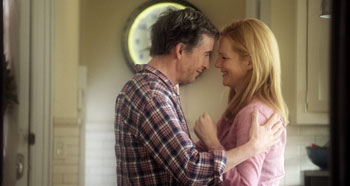 Paul would have difficulty navigating the world without guidance of his wife Claire (Laura Linney). 'Claire is completely devoted to her husband," says Laura Linney. 'As complicated and as flawed as they both are, they have found some magnetic attachment to each other, and I think they would be truly lost without each other and they gather a strength from their synergy. They're very enmeshed, and as he has fallen more and more apart, she has literally lifted him with every ounce of energy that she has." Claire often strives to relieve Paul's anxieties by not communicating everything that is going on in the family. 'She's trying to protect him, because she never really knows when he's going to spiral off into a weakened mental state," says Laura Linney. 'But I also think some of it is about having pure control. She believes that she knows best and has supreme confidence in her own judgment. She's very knowing, and I see that as a huge flaw in someone. It stunts any growth. It keeps you on a very narrow track"but it makes her very potent."
Paul would have difficulty navigating the world without guidance of his wife Claire (Laura Linney). 'Claire is completely devoted to her husband," says Laura Linney. 'As complicated and as flawed as they both are, they have found some magnetic attachment to each other, and I think they would be truly lost without each other and they gather a strength from their synergy. They're very enmeshed, and as he has fallen more and more apart, she has literally lifted him with every ounce of energy that she has." Claire often strives to relieve Paul's anxieties by not communicating everything that is going on in the family. 'She's trying to protect him, because she never really knows when he's going to spiral off into a weakened mental state," says Laura Linney. 'But I also think some of it is about having pure control. She believes that she knows best and has supreme confidence in her own judgment. She's very knowing, and I see that as a huge flaw in someone. It stunts any growth. It keeps you on a very narrow track"but it makes her very potent."
Paul's relationship with his son Michael (Charlie Plummer) has sunk past the point of no return. 'He appears needy and inadequate when what his son wants is someone who is paternal and clear," says Steve Coogan. 'Michael is angry that his father is not strong, which paradoxically makes his father weaker. They're in an unhealthy cycle of a relationship which is potentially destructive and undermining for both of them."
Katelyn (Rebecca Hall), Stan's much younger second wife, has sidelined her career so that she can support her husband while he pursues his political ambitions. 'Katelyn is an archetypal Type-A figure who understands that part of the role of a politician's wife is to be incredibly competent in his world, make everything run smoothly, and look after the children," says Hall. 'The cost of that is more complicated than it appears, because she must be making sacrifices and we don't know whether or not she airs those at home." In the film, Katelyn is upset with her husband from the moment we first see her. 'Stan has suddenly sprung on her what his plans are for the dinner," says Rebecca Hall. 'She feels like she hasn't been let in on the situation, and that reaches a breaking point inside of her."
It soon becomes clear what Stan's motive was for bringing everybody together. Paul and Claire's son, Michael, and Stan's son, Rick, have committed a terrible crime and he wants everyone to discuss what action to take. If the parents take no action, the kids may get away with it"but would that be the best choice? Stan has already made up his mind about what he will do and what he expects everyone else to do. 'He feels he'll state his case and move on, but the night doesn't work out that way," says Oren Moverman. Soon everyone squares off for their territory and their point of view. 'They feel pressed against the wall and feel they have to defend what's theirs, preserve their status quo, their position in life," says Oren Moverman. 'They'll say anything and believe in it in the moment. It's shocking and awful, but this is what we often do. We sometimes dehumanize other people in order to preserve what we want for ourselves. It's an awful human trait but it's a very real one."
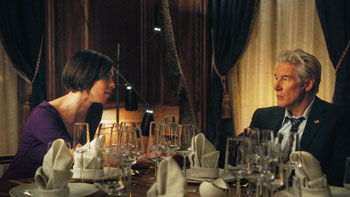 What turns these questions into moral quandaries is that they involve parents' responsibilities to their children. 'We like to think we're moral," says producer Cotty Chubb. 'We comfort ourselves in to thinking that we're good people and we make the right choices, and if circumstances required us to act nobly, we would. But the story puts you in the terrible position of ignoring all of that because your primary impetus as a parent is to protect your child. When the moral imperative and parental imperative are at war, it's hard to know what you'd do. There's no real good ending there where you can both feel moral and like you protected your child." Says Oren Moverman: 'I've had people tell me, without even thinking -You never expose your child, you never give them up, you protect them"I'd kill for my child!' People get very emotional about these things. I think one of the reasons the book was so successful is because it touched upon something that is almost visceral when you are confronted with it." Says Gere: 'I think what makes the film so interesting is that everyone is defensible on some level. We can identify with any one of them at one point or another."
What turns these questions into moral quandaries is that they involve parents' responsibilities to their children. 'We like to think we're moral," says producer Cotty Chubb. 'We comfort ourselves in to thinking that we're good people and we make the right choices, and if circumstances required us to act nobly, we would. But the story puts you in the terrible position of ignoring all of that because your primary impetus as a parent is to protect your child. When the moral imperative and parental imperative are at war, it's hard to know what you'd do. There's no real good ending there where you can both feel moral and like you protected your child." Says Oren Moverman: 'I've had people tell me, without even thinking -You never expose your child, you never give them up, you protect them"I'd kill for my child!' People get very emotional about these things. I think one of the reasons the book was so successful is because it touched upon something that is almost visceral when you are confronted with it." Says Gere: 'I think what makes the film so interesting is that everyone is defensible on some level. We can identify with any one of them at one point or another."
The dinner scenes were filmed over three weeks of night shooting at Alder Manor in Yonkers, New York, built in the early 20th Century. Each night, Oren Moverman began shooting without any rehearsal. 'He likes that immediacy," says Hall. 'He likes that kind of mild hysteria that comes with a group of actors being a little bit frightened that they are going to launch into eight pages of dialogue and haven't really said it out loud yet before. When we came onto the set the camera and lights were set up and he would never really tell us where the camera was or who was getting coverage or what the shot was. He'd just say, -Play the scene.' Says Coogan: 'His approach is, -Let's jump in and start swimming and see if we reach the other side.' You get a vitality and a visceral quality to the dialogue that you wouldn't have if you had rehearsed it. Sometimes it might be a little raw, but it's never staid or tired, it's always alive. He lives dangerously as a director, and that's exactly why I like him."
Richard Gere knows Moverman well, having collaborated with him as a writer/director on Time Out Of Mind and as the producer of Joseph Cedar's Norman. 'Oren is always interested in the thought processes, which is great for actors because it's all we have, really, is that quicksilver movement of thoughts and emotions. His films are like a mirror, but not a direct one. You have to look. The glass isn't clear and the lighting is a little shadowy, so you have to work to see what's there in the mirror. There's a shadow world."
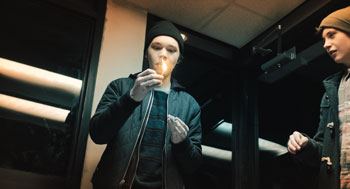 The story of The Dinner follows an unpredictable path: it jumps around in time and place, even around the restaurant itself, and much of the action involves the characters attempts to distract from talking about the subject that desperately needs to be discussed. Paul's voice is a constant on the soundtrack, ladling out a perspective that gradually reveals itself as unreliable about himself as it is about the other characters. 'There's a strategy to the storytelling that is not straightforward," says Oren Moverman. 'I wanted the film, like Paul, to in a way, have its own mental health issues, its own tangents, its own difficulties in keeping the complexities of family relationships in focus." To help the audience find its way through the various shifts, Moverman and cameraman Bobby Bukowski gave the film three primary visual styles: one for the restaurant; a second for the crime; and a third for the family history. 'The blending of all them was going to add up to the experience of sort of trying to understand and get closer to these characters," says Oren Moverman. The restaurant is filmed in warm colors, accentuated in each of its rooms by the glow of fire, which resonates with the crime scene. The night of the crime is shown in colors that rapidly change from icy blues to reds. 'There's a scene when they walk into the ATM that starts off in this very kind of warm color," says Moverman. 'And then as they walk in it changes into a much colder, much less forgiving treatment. The extreme nature of the act of the crime is reflected in the instability of the color." Scenes involving the past also had their unique look. 'The family history is mostly done in a blown-out way where it's dominated by a by a little bit of green and over-exposed harshness that sometimes memories exist in"sort of hazy, unreliable images."
The story of The Dinner follows an unpredictable path: it jumps around in time and place, even around the restaurant itself, and much of the action involves the characters attempts to distract from talking about the subject that desperately needs to be discussed. Paul's voice is a constant on the soundtrack, ladling out a perspective that gradually reveals itself as unreliable about himself as it is about the other characters. 'There's a strategy to the storytelling that is not straightforward," says Oren Moverman. 'I wanted the film, like Paul, to in a way, have its own mental health issues, its own tangents, its own difficulties in keeping the complexities of family relationships in focus." To help the audience find its way through the various shifts, Moverman and cameraman Bobby Bukowski gave the film three primary visual styles: one for the restaurant; a second for the crime; and a third for the family history. 'The blending of all them was going to add up to the experience of sort of trying to understand and get closer to these characters," says Oren Moverman. The restaurant is filmed in warm colors, accentuated in each of its rooms by the glow of fire, which resonates with the crime scene. The night of the crime is shown in colors that rapidly change from icy blues to reds. 'There's a scene when they walk into the ATM that starts off in this very kind of warm color," says Moverman. 'And then as they walk in it changes into a much colder, much less forgiving treatment. The extreme nature of the act of the crime is reflected in the instability of the color." Scenes involving the past also had their unique look. 'The family history is mostly done in a blown-out way where it's dominated by a by a little bit of green and over-exposed harshness that sometimes memories exist in"sort of hazy, unreliable images."
In addition to these three basic schemes, there is a fourth element to the film's visual plan, where it uses a visual language to echo Paul's breakdown at Gettysburg, the setting of America's bloodiest battle, a turning point for the Civil War as it is for Paul. 'I used a subjective color treatment and distorted sound for the Gettysburg montage to express Paul's precarious mental state," says Moverman. 'It's as if the movie has its own mental breakdown, and life, history, and awareness all become noise in his head. The movie works its way toward Gettysburg, which is presented in a very surreal and abstract way, and then makes its way back from that"to reality." Oren Moverman found that Gettysburg took on increased dimension as he developed the connection to the character. 'Gettysburg is for me, akin to a national mental illness," says Oren Moverman. 'The war of the country within itself at the core of every emotional, physical, spiritual, psychological thing that this country has not recovered from. So what we're seeing in Paul is not just the psychological scars of one human being, but also the psychological scars of a country."
The Dinner has 66 music cues, more than can be found in many film musicals. Working with famed Music Producer Hal Willner and Music Supervisor Rachel Fox, Moverman assembled a score that includes tracks from such diverse artists as Bob Dylan, Antony and the Johnsons, Phillip Glass, Firewater, Nico, White Magic, Firewater, Leonard Cohen, and Savages. 'It's a bizarre collection," says Oren Moverman. 'I wanted a very eclectic variety of music. There are many parts of the restaurant, and I wanted each one of those places to have a different song playing at the same time. I think that's a good representation of the fractured nature of these people and their world. I also wanted music to play against the mood of conversations in the scenes, so an amusing song could be used with a very serious scene."
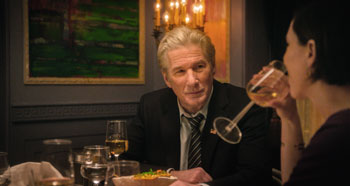 While the book The Dinner came out years ago, the story has tremendous resonance with what is going on in the world at large today, from Brexit to Trump. 'The phenomenon of our era is that we live in a post-humanist society," says Oren Moverman. 'There's a real reluctance to acknowledge the humanity of people who are not in your tribe. So many people are only acting out of their perceived self-interest and it's very hard for them to recognize other people's suffering or points of view." Says Gere: 'There is this sense of, in the end, I'm going to protect mine"the ones who look like me, talk like me, same language, come from the same place, the ones we have history with. Everyone else is the other. Let them worry about themselves." Says Linney: 'It's not the best of human nature that you're looking at in this story. There is a wild sense of entitlement that's running rampant. When there's an all-knowing justification in every viewpoint, it makes conversation very difficult."
While the book The Dinner came out years ago, the story has tremendous resonance with what is going on in the world at large today, from Brexit to Trump. 'The phenomenon of our era is that we live in a post-humanist society," says Oren Moverman. 'There's a real reluctance to acknowledge the humanity of people who are not in your tribe. So many people are only acting out of their perceived self-interest and it's very hard for them to recognize other people's suffering or points of view." Says Gere: 'There is this sense of, in the end, I'm going to protect mine"the ones who look like me, talk like me, same language, come from the same place, the ones we have history with. Everyone else is the other. Let them worry about themselves." Says Linney: 'It's not the best of human nature that you're looking at in this story. There is a wild sense of entitlement that's running rampant. When there's an all-knowing justification in every viewpoint, it makes conversation very difficult." 'It all comes to a head in this era and in this story," says Oren Moverman. 'Everyone has an agenda and they're going to fight it out to win, but at the end of the day, no one wins, because there is no winning. The only thing that happens is that everything is finally out there in the open."
The Dinner
Release Date: August 31st, 2017
MORE





